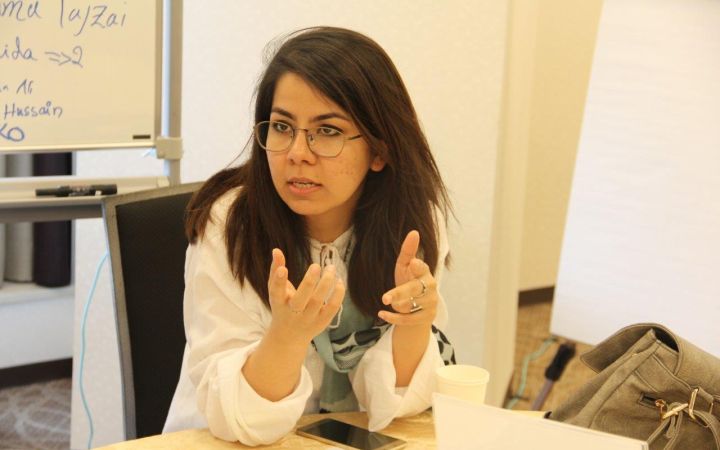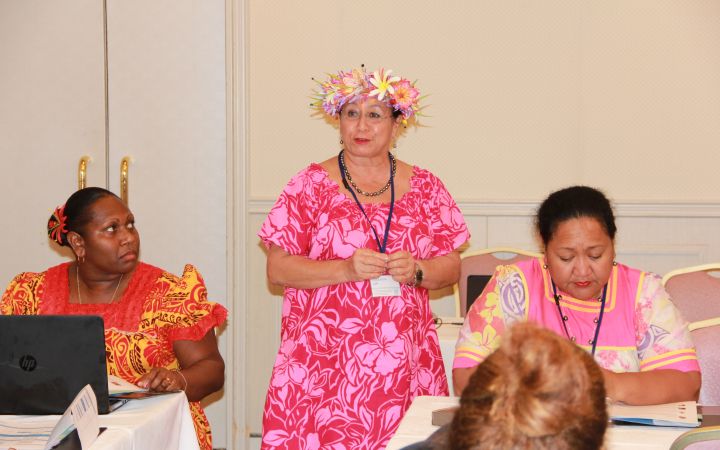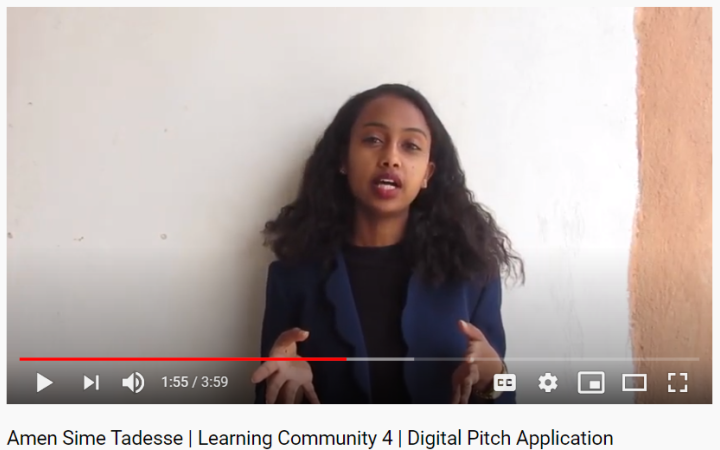It’s been 20 years since the Taliban government fell in Afghanistan. Many young women are now growing up knowing they have the right to opportunities and hoping to shape their own lives. But conservative attitudes persist. Madina Walizada, a UNITAR alumna from Afghanistan, says:
I thought ‘I’m a girl, I don’t have equal rights that my brothers have.’
“People don’t believe women can take over tough work”, says Mariam Ghaznavi, another UNITAR Afghan alumna.
Some [colleagues] believe that my good manners and soft behaviour make me incapable of dealing with the harsh realities of the system.
It’s not just in Afghanistan. When Ethiopian entrepreneur Amen Sime Tadesse and her all-women company approach investors, they often are recommended to add a male member to the team.
Is there something wrong with being an all-women team?, she wonders.
As the world reels from the effects of the COVID-19 pandemic, it is women – especially those in fragile states such as Afghanistan and Ethiopia – who hold a key to their societies’ recovery.
The COVID-19 pandemic’s impact on women
The COVID-19 pandemic is highlighting both the crucial roles women are playing in the COVID-19 response and the disproportionate effects they suffer.
Around the world, women make up the majority of frontline workers fighting the pandemic, including 70 per cent of the healthcare workforce worldwide. Women government leaders, such as New Zealand’s Prime Minister Jacinda Ardern or the all-women team leading Finland, have been praised as having skilfully led the pandemic response.
Yet women, especially those in the developing world, are hard hit by worsening inequalities triggered by the pandemic. Economically, women earn less than men, have fewer savings and access to financial services, and are more likely to work in the informal economy, making them more vulnerable to economic shocks. Lockdowns have directly struck women’s small and medium-sized businesses and the industries where women are more likely to be employed.
Women have fewer social protections and carry much of the burden of unpaid care and domestic work, according to the United Nations Secretary General’s report. Women are also underrepresented in decision-making at all levels.
Even when the pandemic is brought under control, these effects will persist for years to come.
Why UNITAR focuses on women’s leadership
The UN theme for International Women’s Day 2021 is “Women in leadership: Achieving an equal future in a COVID-19 world.” Sustainable Development Goal (SDG) 5, gender equality, calls for “women’s full and effective participation and equal opportunities for leadership at all levels of decision-making in political, economic and public life” – and while its targets specifically address female parity, SDG5 is a cross-cutting issue, whether it’s in ending poverty (SDG1) and hunger (SDG2), promoting health (SDG3)and education (SDG4), securing decent work (SDG8), addressing climate change (SDG13), and accessing social justice (SDG16).
“Empowering women, particularly reflecting voices of women in decision-making, is central to overcome the pandemic and build back better,” says Mihoko Kumamoto, Director, UNITAR Division for Prosperity. “We continue to observe direct and indirect gender-based discrimination in both developing and developed countries. UNITAR is stepping up efforts to shape an inclusive society by imparting knowledge and skills and enhancing networks of change-makers.”
When women have the right skills and tools and feel empowered, they can become leaders in their families, communities, and countries. They can implement innovative and inclusive solutions that address real problems and drive recovery from crises.
Women’s leadership in their communities
In national and local governments, women not only can diversify the approaches to leadership and perspectives in the room; they can bring about more effective and inclusive government responses by incorporating women’s realities in policies and relief programmes.
Take disaster risk management, for example. Disasters impact women first, with longer-lasting consequences. By bringing a more comprehensive understanding of the repercussions of disaster, be it tsunami, flood or pandemic, women’s leadership makes disaster risk reduction interventions more effective and communities more resilient.
The UNITAR Tsunami-based Disaster Risk Reduction (DRR) programme brings female professionals from small island developing states (SIDS) to train them on leadership and communication skills. Supported by the Government of Japan and now in its fifth year, the DRR programme helps women leaders understand the distinct gender-specific capacities and vulnerabilities that can help communities prevent, prepare for, confront, and recover from disasters.
In the Cook Islands, Lydia Sijp, Planning and Advisory Officer with the Emergency Management Cook Islands and a community leader, is among several UNITAR DRR alumnae helping their communities better prepare for annual cyclones. Lydia serves as a linchpin between the national government agency and local disaster risk management committees: as a government official, she helps shape national disaster management; as a community leader, she makes sure that the communities have access to government resources, information and training, and that the realities on the ground inform the national response.
This national government–community infrastructure was also tapped by the Ministry of Health to respond to the threat of COVID-19 and a dengue outbreak. “The emergency operation centres were activated by the [local disaster risk management committees],” says Lydia, because the Ministry of Health “didn’t have the infrastructure” to reach the communities.
Lydia and her fellow UNITAR alumnae are setting an example for the women and girls in their communities. “There’s a lot of excellent women that are stepping forward in the village committees…. We get them, the real community women, we only have to call on them. And they will come in, and they will help,” she says.
Women’s leadership in business
UNITAR alumnae are also exercising leadership in business settings, many of them supporting social development.
The young Ethiopian entrepreneur Amen is taking part in the UNITAR Social Entrepreneurship Training Programme for Women in Ethiopia, Kenya, Somalia and Sudan, which is supported by the Government of Japan. Amen and her UNITAR course mates are running or about to start businesses that provide a social good. Each woman aspires to build a sustainable revenue-generating business that addresses real needs in her society.
I want to create a sustainable product that could solve a customer’s problems and society’s problems,
says Amen, whose company provides IT training to young people. Her aim is to enable more young people to harness the power of IT for their futures and contribute to Ethiopia’s longer-term growth.
Others – from Ethiopia, Kenya, Somalia and Sudan – are training youth and connecting them with local employers, building affordable housing with local materials and local labour, working with rural communities and young scavengers to improve access to water, sanitation and hygiene, and providing affordable healthcare services, among others.
In so doing, they are breaking barriers, changing the face of the male-dominated world of entrepreneurship. Women now comprise 36% of small business worldwide, generating approximately USD1.9 trillion in revenue.
UNITAR support network for women leaders
In addition to building technical skills, UNITAR Division for Prosperity programmes are filling another important gap to help women leaders thrive, notes Mariam, an alumna of the UNITAR Afghanistan Fellowship Programme and the UNITAR-OXUS Leadership, Organizational Needs Assessment, and Agri-Business Sector Development Training Programme. The programmes were supported, respectively, by the Prefectural Government of Hiroshima and OXUS Afghanistan, and by the OXUS Consulting Group.
When she completed her UNITAR training, Mariam was surprised to find that technical skills were not the only thing she had gained. “I completed the fellowship with the feeling that I am not alone in my journey but actually have a strong support system, from mentors to coaches and fellows who joined the programmes from all walks of life with different backgrounds, experience and personalities.”
She points out that women in her country lack the support system to help them climb the career ladder and overcome workplace politics and other obstacles. The UNITAR alumnae network holds her up. “I can always go to [them] when I have issues and problems.”
Mariam is driven to support other women in their journeys and now volunteers as a resource person and coach for the UNITAR programmes.
In this walk, I want to make sure that I am holding as many hands as I can.
Changing attitudes about gender
UNITAR Prosperity programmes are having a ripple effect. Despite the particularly challenging circumstances and environments in which many UNITAR alumnae must work, the women believe the trainings have given them the strength, the motivation, and the skills and tools needed to make a difference.
Amen in Ethiopia says the UNITAR training motivates her to pursue her goals. “I learned that women entrepreneurship is a key driver for economic growth, that being a woman is ok. It’s very brave to be a woman entrepreneur!”
Women in leadership positions also change existing attitudes by doing their jobs. In Afghanistan, Mariam was received with scepticism when she was promoted to be the first female Director of Customs Support and Development in the Ministry of Finance.
“Some referred to my promotion as merely a government measure to [meet] gender equality benchmarks,” she says. But in less than two years, her colleagues’ attitudes changed. It was a joyous moment for Mariam “to hear colleagues in the leadership meeting say ‘It would be great to bring in more women into junior and senior positions.’”
An alumna of the UNITAR Frontier Technologies for Sustainable Development: Unlocking Women’s Entrepreneurship through Artificial Intelligence in Afghanistan and Iraq course, supported by the Swedish International Development Cooperation Agency (Sida), Madina says:
[after completing the UNITAR training,] I started changing from myself first. I feel a lot of confidence [that] I can achieve anything in life that I want to achieve.... I can share this knowledge with other women and girls and change their lives.
This International Women’s Day, we celebrate the UNITAR alumnae who are making a difference in their communities. We know that empowering women and girls paves the way for them to claim their rights to exercise decision-making and leadership power. Inspired by our alumnae, UNITAR affirms our commitment to support women’s leadership to “build back better” from a COVID-19 world.




